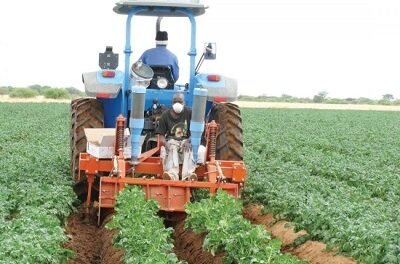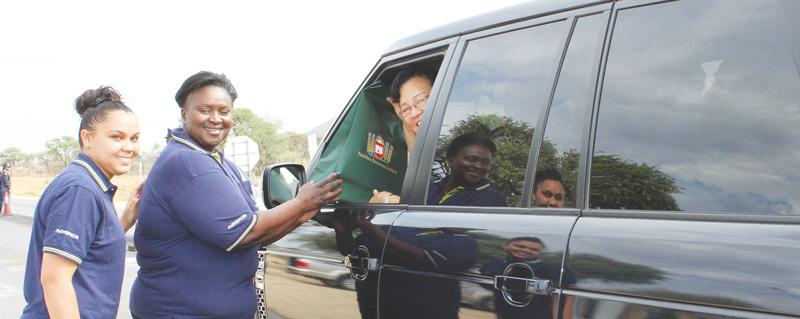
Shining a spotlight on uranium: How can Namibia’s young minds drive the future of mining

Namibia contains 7% of the planet’s uranium reserves. Uranium mining began in the 20th century, and since then it has continued to grow. In 2021, according to the calculations of the World Nuclear Association (WNA), the country entered the top three in production.
However, Namibia emerges as an untapped power player in the global mining arena while uranium mining can significantly affect the country’s economy, improve the well-being of local communities, and overcome unemployment in the region by increasing the number of jobs.
In this article, Vasti Mantedo shares her views on technical sciences in Namibia, teaching in the Khomas region, as well as on the prospects for the development of the uranium mining industry in Namibia and what role African youth can play in this process.
The way to personal development
I was born and raised in Leonardville, Namibia, where my education began. I attended a boarding school in the beautiful region of Erongo for high school, and it was there that I discovered my passion for Mathematics and Physics. However, financial constraints hindered my ability to pursue higher education immediately after high school, so I took a gap year to consider my options. During that time, I found support through the NSFAF, a government-sponsored bursary program that helped me pursue my dreams.
I obtained my first degree in Physics and Geology, followed by a Master’s degree in Physics from the University of Namibia. I also completed a Postgraduate Diploma in Education with a focus on Mathematics and Physical Sciences at The International University of Management.
Now, I am a high school educator at Windhoek Technical High School, where my mission is to inspire my students and help them reach their potential in the fields of science and technology. Ultimately, I aspire to become a clinical medical physicist and contribute to advancements in healthcare through my knowledge of Physics.
I am grateful for the support I have received and look forward to making a positive impact in the world of science and education.
Unlocking Namibia’s untapped energy potential
Namibia, a nation brimming with untapped potential, stands poised to emerge as a significant player in the global energy landscape, offering a gateway to sustainable development and robust economic growth. In the realm of nuclear energy, Namibia’s future shines brightly as it contemplates the establishment of nuclear power plants, underpinned by meticulous safety protocols and a reservoir of expertise.
The country boasts an array of uranium deposits, rich in reserves, and notably, a vast sandstone deposit has been unearthed in the Omaheke region, offering promise for extraction through the In-Situ Recovery (ISR) method. The fact that this resource lies within the confines of Leonardville, my birthplace, holds particular significance. Leonardville, a small town grappling with stark economic disparities, where more than 70% of its residents face unemployment or subsist on minimum wages, stands poised for transformation through the advent of mining operations.
The introduction of a mining enterprise is anticipated to usher in not only economic prosperity but also social revitalization, fueled by an influx of individuals into and out of the region. Foreseen improvements in infrastructure, essential to accommodate this heightened activity, are expected to stimulate the demand for services, thereby engendering a wave of job opportunities, particularly for community members and the broader Omaheke region.
Examining the varied perspectives on uranium mining in the region
As devoted Namibians, our unwavering commitment to our cultural heritage, religious beliefs, and way of life is a testament to the profound significance we attribute to these aspects of our identity. They form the bedrock of our existence, providing us with an unwavering sense of belonging, spirituality, and purpose. It’s a steadfast connection that sets us apart in a world where many nations and ethnicities are witnessing the erosion of these cherished traditions at an alarming pace. In the face of such change, Namibians are resolute in their determination to preserve these vital elements of our identity.
In recent times, the discovery of uranium in the Omaheke region has brought to the forefront a spectrum of opinions, predominantly tinged with negativity, surrounding both the uranium deposit and the subsequent mining processes. Amongst this diversity of viewpoints, a prevailing concern centers around the perception that the extraction process encroaches upon lands deemed sacred, ancestral, and deeply ingrained in the local communities’ cultural tapestry. Furthermore, apprehensions loom large over the safety aspects, spanning concerns about radiation exposure and potential water contamination.
Compounding these reservations is the element of the unknown, as a relatively small portion of our rural communities have had cause to delve into matters related to mining. The absence of prior engagement with such endeavors has contributed to a lack of familiarity and understanding, thereby heightening concerns. Unlike awareness groups focused on issues such as HIV, cancer, and astrophysics, our region has yet to witness a concerted effort to educate communities about nuclear energy. Knowledge, we understand, wields the power to instill confidence and bolster a profound sense of safety.
In contrast, it’s heartening to witness the optimism and anticipation that many hold for the development and economic growth that mining promises to usher into our community and the broader region. This dichotomy underscores the importance of balanced discourse and informed decision-making as we navigate the path toward harnessing our resources for the benefit of our beloved Namibia.
A path to understanding uranium mining
In my perspective, one pivotal solution to mitigate the tensions accompanying uranium mining lies in a concerted effort to educate and raise awareness about nuclear energy and mining. I believe that if the government takes proactive measures to educate local community members and initiates well-structured awareness programs and groups within the regions, it will foster greater support for uranium mining endeavors. Furthermore, empowering knowledgeable community members to lead these initiatives can facilitate a deeper understanding of the advantages and disadvantages of uranium mining, thereby engendering more informed support for this vital industry.
Uranium One’s contribution to the education of the region
Last year, a remarkable collaboration between Uranium One, Academic Tutelage, and Ritja Career Fair culminated in a highly successful career fair for school learners. This collaborative effort bore fruit by providing an invaluable wealth of information to the learners, making it an event of profound significance. Indeed, it can be aptly described as a transformative experience and a true blessing for each participating child.
Furthermore, Uranium One has generously supported the renovation of primary schools in Leonardville, a laudable initiative that not only rejuvenated educational infrastructure but also provided temporary employment opportunities for the youth in the Leonardville community. This multifaceted approach not only enhances educational facilities but also contributes to the economic well-being of the region’s young residents.
With the continued presence and involvement of Uranium One, we hold the firm belief that this partnership will be an immense asset to the community. It is abundantly clear that Uranium One’s presence represents a significant and unparalleled benefit to the Omaheke region, embodying the spirit of corporate responsibility and community empowerment.
A roadmap for youth to explore uranium mining
Fostering familiarity among the youth with the intricacies of uranium mining stands as a pivotal imperative, underscored by the need for heightened awareness. I firmly believe that the youth constitute both the ears and the voice of our community, uniquely positioned to spearhead educational initiatives and amplify awareness throughout our society. We must extend unwavering support to those young individuals who harbor an interest in delving into the realm of uranium mining. This support should manifest in the form of scholarships that encompass a comprehensive educational journey, commencing from the pre-school stage and extending seamlessly to the tertiary level.
The domain of mining is a vast landscape, replete with numerous subsections that traverse the spectrum from exploration to mineral extraction. Within this expansive terrain, I hold a profound conviction that the youth can readily identify a niche that resonates with their interests and aspirations. Nurturing their curiosity and facilitating their educational journey will not only empower them with knowledge but also equip them to serve as ambassadors of awareness, disseminating crucial information to the wider community.
In essence, we empower our youth not only as future mining professionals but as educators and advocates who will play a pivotal role in shaping the collective understanding of uranium mining within our society.











































